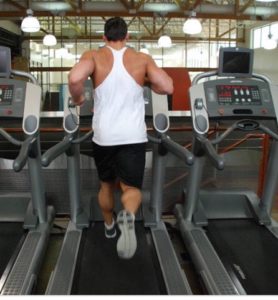Today let's look at a lofty goal: taking 10000 steps a day. Now, we all know that exercise is crucial for our health. And, as your Texas vein specialists, we want you to know that movement—especially walking—is great for your veins. In fact, according to an eight-year study from the AARP, moving just 15 minutes a day could add three years to your life.
So, we confirm: exercise is important. But what about walking 10000 steps a day? Well, according to that AARP study, every additional 15 minutes of activity lowers your mortality risk by another 4%. But do you need to hit a set goal?
It's a good question, because that number gets floated around a lot right now. It’s the target for every FitBit user out there, and the subject of much debate. So what does that mean for people who can’t get in 10,000 steps. Is more better? Is less worthless? Here’s what you need to know about walking, your overall health and, specifically, your vein health.
Again, doing any amount of daily walking is better than nothing. In fact, by walking just a mile, you can burn at least 85 calories, and that number can increase if you walk faster, or add inclines to you're route. But if you're feeling like you need to hitting 10,000 steps a day to really reap the benefits of walking, here's some good news. According to a new study in JAMA Open Network, getting in 7,000 a steps a day might be just as beneficial.
What's the story? After tracking participants for about 11 years, researchers noted that taking 7000 steps each day lowered people's risk for premature death of any kind by between 50 and 70%. Yet, while these results were exciting, researchers noted that upping your daily movement by any amount would yield positive results for your health. So you can still try to hit that 10000 steps a day goal. But don't feel defeated on days when it's not attainable.
Walking carries so many potential benefits. Let’s take a closer look. 
1. Walk your way to weight loss.
Even though it’s low-impact, walking is still a great form of cardiovascular exercise. You burn calories when you walk, helping support your weight goals. And, because it won’t put much pressure on your joints, it’s an accessible exercise option for many people. And you start enjoying the benefits of walking with even a few minutes each day, so you don’t need to hit 10,000 steps a day to get benefits.
2. Walking can reduce the appearance of varicose veins
When you walk, you’re doing important work for your veins. Why is walking so important? Your venous system is made up of the muscles, veins, and valves you find in your calf and foot. When functioning properly, these components work together to push blood from your legs up to your heart. But they need to be strong in order to work properly, since stronger muscle contractions give the push your blood needs to flow against gravity.
Now, walking is a great way to strengthen the muscles in your calves, since it targets those specific muscles. Just the simple activity of walking also helps push blood up and out of your legs. This helps prevent the type of pooling which can cause your veins to bulge. Already have varicose veins? Here’s the good news: walking can help ease some of the swelling and pain you may experience already. Ideally, you’d walk for at least 30 minutes a time, which is likely short of 10,000 steps but is still a great place to start.
Some research suggests that how fast you walk each day matters far more than how many steps you take. Why is that the case? In a study from the University of Sydney and the University of Southern Denmark, scientists followed close to 80,000 individuals from 2013 to 2015 as they walked regularly while wearing an activity tracker that clocked their step count and speed.
Want to know what they found? After seven years, taking 10,000 steps a day appeared to lower dementia risk by approximately 50%; cancer risk by 30%; and cardiovascular disease risk by about 75%. Now here's where things get interesting. Borja del Pozo Cruz, one of the lead study authors, noted that walking at a faster pace further decreased dementia risk by another 10 to 15%, suggestion, "How fast you walk is as important, if not more important, than how much you walk. For even more optimal health you would go about doing 10,000 steps and perhaps 30 minutes of those at a faster pace."
Regardless of the step count you've set as your goal, one thing is very important: don't try to make major jumps in total step count all in one day. For example, if you've set 10,000 steps as your daily goal, but right now you only walk a total of about one mile each day, you should slowly build up your stamina and strength until you can comfortably reach higher distances. That could mean breaking up your steps throughout the day, or challenging yourself to walk for longer consecutive periods of time. Either way, be sure to fuel your increased movement with healthy snacks. And always pause and listen to your body if you get tired or feel any sign of discomfort.
Of course! 10000 steps a day is a great target number to hit, but it’s not the only way to win your fitness routine. Think of it like your diet: you should try to make good choices all the time, but even eating well one day a week is still a great start toward your health goals.
In fact, a study in JAMA Internal Medicine suggested that taking as few as 4400 steps each day reduced your risk for premature death by 41% when compared to taking 2500 steps a day. And you could get those steps in any way you want—power walking, strolling, or even just walking around your house and cleaning up.
So, what does that suggest to all of us? When it comes to movement and walking, more is likely better. But anything you do is likely to have a positive impact on your general health. So, how can you take more steps each day, especially in this time of limited excursions? Check out our tips for adding steps to your daily counting goals.
1. Choose to move

If you’re driving to an appointment, park farther away from the entrance. If you’re going up a few floors in a building, take the stairs instead of the elevator (and score some bonus social distancing points!) Need the kids to come inside now? Call out to them instead of just shouting from your front porch (your neighbors will also be pleased, we’re guessing.) In short, look for opportunities to build movement into your daily routine. And take those opportunities when you find them!
2. Ring the alarm
When you’re stuck working from home, or even if you get to go back to your office, it can be easy to stay glued to one spot. Don’t let this happen! Instead, set a reminder on your phone or watch for regular intervals: every 15 minutes, 30 minutes or even every hour. And when that reminder goes off, don’t press snooze: instead, get up and move. Walk to the kitchen for a drink of water, walk the stairs in your building—just do something that keeps your blood pumping in those legs for at least 5 minutes.
3. Don’t get defeated
One final thought on those 10,000 steps: there’s nothing wrong with setting movement goals for yourself. But don’t get defeated if you don’t hit those goals, and give up entirely. Instead, try to set the bar to an attainable goal at first, gradually working your way up to 10,000 steps or beyond. Just be sure to clear any new fitness routine with your doctor before you get started, in order to prevent any complications. And click here to request an appointmentclick here to request an appointmentclick here to request an appointment with our Texas vein specialists, to discuss movement that's safe for your current state of vein health.

Scheduling
Please contact our dedicated specialists to schedule a consultation today.
2024 Texas Endovascular. All rights reserved. Website Design by Healthcare Success